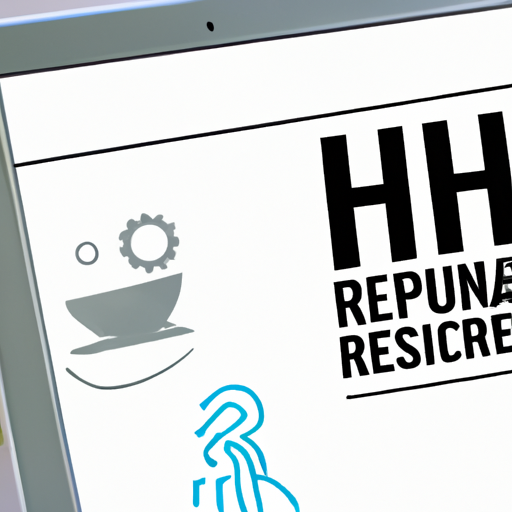In today’s ever-changing legal landscape, ensuring compliance with human resources (HR) regulations can be a daunting task for businesses. However, with the advent of HR compliance software, companies now have a powerful tool at their disposal to simplify and streamline their HR processes. This software not only helps businesses stay up-to-date with the latest laws and regulations but also automates tasks such as employee onboarding, performance management, and leave management. With its user-friendly interface and comprehensive features, HR compliance software is revolutionizing the way businesses approach compliance and minimizing the risk of legal disputes. Discover the numerous benefits of this innovative technology and how it can benefit your business.
HR Compliance Software
HR compliance software is a crucial tool for businesses to ensure that they are adhering to legal regulations and best practices in human resources. With the increasing complexity of employment laws and the need for accurate record-keeping, HR compliance software provides a centralized platform for managing employee data, tracking compliance tasks, and reducing risks. This article will explore the benefits and features of HR compliance software, discuss its importance in maintaining legal compliance, provide tips for choosing the right software, outline the implementation process, highlight GDPR compliance considerations, showcase top software providers, explain how it streamlines HR processes, and address common FAQs.
Benefits of HR Compliance Software
Increased Efficiency
HR compliance software streamlines HR processes by automating repetitive tasks, such as data entry and document management. With this software, you can say goodbye to manual paperwork and time-consuming administrative tasks. By eliminating manual processes, HR teams can focus on more strategic activities and improve overall productivity.
Time and Cost Savings
By automating compliance-related activities, HR compliance software saves valuable time and reduces costs associated with manual processes. It eliminates the need for paper-based filing systems and reduces the risk of errors, which can lead to costly penalties. With streamlined workflows and automated reporting, businesses can allocate their resources more efficiently.
Reduced Compliance Risks
Maintaining compliance with employment laws is critical for businesses to avoid legal consequences. HR compliance software provides features such as compliance tracking and reporting, ensuring that companies can monitor and manage their compliance obligations effectively. By providing real-time alerts and reminders for important compliance tasks, the software helps mitigate risks and ensures that businesses stay on top of their obligations.

Features of HR Compliance Software
Employee Records Management
HR compliance software allows businesses to store and manage employee records securely. It provides a centralized repository for employee data, including personal information, employment history, training records, and performance evaluations. With easy access to accurate and up-to-date employee records, businesses can ensure compliance with record-keeping requirements and facilitate efficient HR processes.
Document Creation and Storage
This software enables businesses to create, store, and manage HR-related documents in a centralized and secure environment. It eliminates the need for physical document storage and reduces the risk of losing important files. With features like version control and document tracking, businesses can maintain a comprehensive document trail, ensuring compliance with document retention requirements.
Policy and Procedure Management
HR compliance software assists in managing HR policies and procedures by providing a platform for creating, updating, and distributing these important documents. It ensures that employees have access to the latest policies and procedures, and facilitates easy communication and acknowledgment of policy updates. With built-in compliance tracking, the software helps organizations ensure that their policies align with legal requirements.
Compliance Tracking and Reporting
One of the key features of HR compliance software is its ability to track and report on compliance-related activities. It provides businesses with a dashboard that highlights upcoming compliance tasks, deadlines, and overdue items. Through automated reporting, businesses can generate compliance reports quickly and accurately, allowing them to monitor their compliance efforts and address any gaps.
Training and Development
HR compliance software often includes training and development modules that enable businesses to deliver employee training programs. With this software, companies can track employee training progress, record certifications, and ensure that employees receive the necessary training to comply with regulations and internal policies. It promotes a culture of continuous learning and development within the organization.
Performance Management
Some HR compliance software includes performance management features that help businesses track and evaluate employee performance. It allows for goal-setting, performance reviews, and feedback collection. By integrating performance management with compliance efforts, businesses can align individual performance with organizational objectives and ensure fair and consistent evaluation practices.
Data Security and Privacy
HR compliance software prioritizes data security and privacy. It ensures secure storage and access controls for sensitive employee information, protecting it from unauthorized access or breaches. Compliance with data protection regulations, such as the GDPR, is a top priority for these software providers, ensuring that personal data is processed lawfully, transparently, and securely.
Importance of HR Compliance Software
Avoiding Legal Consequences
Ensuring compliance with employment laws is crucial for businesses to avoid legal consequences. Non-compliance can result in costly fines, penalties, and lawsuits. HR compliance software helps businesses stay updated on changing laws and regulations, ensuring that they have the necessary mechanisms in place to comply with legal requirements. By automating compliance tasks and providing a centralized platform for managing compliance efforts, businesses can mitigate the risk of non-compliance and protect themselves from legal liabilities.
Mitigating Risks
HR compliance software provides businesses with a proactive approach to mitigating risks. By tracking compliance tasks and providing alerts and reminders, the software prevents compliance-related issues from falling through the cracks. It helps businesses identify potential compliance gaps or violations and take corrective action before they escalate into significant risks. With a comprehensive view of compliance efforts, businesses can make informed decisions to mitigate risks effectively.
Ensuring Consistency and Fairness
HR compliance software promotes consistency and fairness in HR practices. It ensures that policies and procedures are applied consistently across the organization, reducing the risk of biased decision-making. By providing a central repository for policies, procedures, and employee records, the software prevents discrepancies and ensures that all employees are subject to the same standards. This consistency fosters a fair and inclusive work environment.
Enhancing Employee Trust and Satisfaction
Compliance with employment laws and regulations is not only essential for legal reasons but also for fostering a positive workplace culture. When employees see that their employers are committed to compliance, it enhances their trust and confidence in the organization. HR compliance software ensures that employees’ rights are protected, promotes transparency in HR processes, and provides a secure platform for addressing employee concerns. By investing in compliance, businesses can create a positive work environment that nurtures employee satisfaction and engagement.

Choosing the Right HR Compliance Software
Assessing the Company’s Needs
When choosing HR compliance software, it is important to assess the specific needs of the company. Consider the size of the organization, the number of employees, and the complexity of HR processes. Determine which compliance tasks are the most critical for the organization and identify any specific industry requirements. Understanding these needs will help in selecting software that aligns with the organization’s goals and priorities.
Scalability and Flexibility
It is crucial to choose HR compliance software that can accommodate the growth and changing needs of the organization. Consider the scalability and flexibility of the software to ensure that it can adapt to future changes. Look for software that can handle an increasing number of employees, integrate with other HR systems, and support additional compliance requirements as the organization expands.
User-Friendly Interface
Usability is a key factor in the adoption and success of HR compliance software. Choose software that has an intuitive and user-friendly interface, making it easy for HR professionals to navigate and perform their tasks efficiently. Consider software that offers customization options, allowing businesses to tailor the interface to match their specific requirements and workflows.
Integration with Existing HR Systems
To maximize the benefits of HR compliance software, it is essential to choose software that can integrate with existing HR systems. Seamless integration allows for the exchange of data and reduces duplication of efforts. The software should be compatible with the organization’s current HR software and ensure a smooth transition without disrupting existing processes.
Customer Support and Training
When implementing HR compliance software, adequate customer support and training are crucial for successful adoption. Choose a software provider that offers comprehensive training programs and ongoing support to ensure that HR professionals are equipped with the necessary knowledge and skills to effectively use the software. Look for providers that offer responsive customer support and have a reputation for providing excellent service.
Cost Analysis
Consider the cost implications of implementing HR compliance software. Look beyond the initial upfront cost and evaluate the long-term value and return on investment. Consider factors such as licensing fees, implementation costs, maintenance and support fees, and any additional costs associated with customization or integration. Conduct a cost-benefit analysis to determine the software’s affordability and its potential impact on the organization’s bottom line.
Implementing HR Compliance Software
Developing an Implementation Plan
Before implementing HR compliance software, it is crucial to develop a comprehensive implementation plan. This plan should outline the goals and objectives of the implementation, the timeline, key stakeholders, and the specific tasks involved. Consider any potential challenges or risks and develop strategies to address them. By having a well-defined implementation plan, businesses can ensure a smooth and successful transition to the new software.
Data Migration and Integration
During the implementation process, businesses must migrate their existing HR data into the new software. This includes employee records, policies, procedures, and any other relevant documents. Work with the software provider to define the data migration process and ensure that all data is accurately transferred. Integration with existing HR systems should also be considered to ensure data consistency and eliminate duplication.
Training and Change Management
Training employees on how to use the new software is critical for successful adoption. Develop a training program that covers all aspects of the software and provides hands-on experience. Consider creating user guides, conducting training sessions, or providing access to online learning resources. Additionally, organizations should implement change management strategies to ensure a smooth transition and address any resistance or concerns from employees.
Monitoring and Evaluation
Once the HR compliance software is implemented, it is important to continuously monitor and evaluate its effectiveness. Establish key performance indicators (KPIs) to measure the software’s impact on HR processes, compliance efforts, and overall organizational goals. Regularly review and analyze data to identify areas for improvement and make any necessary adjustments. Ongoing monitoring and evaluation will help businesses maximize the benefits of the software and drive continuous improvement.
Ensuring GDPR Compliance with HR Software
Data Protection and Privacy Laws
The General Data Protection Regulation (GDPR) is a European Union regulation that aims to protect individuals’ personal data and harmonize data protection laws across EU member states. Compliance with GDPR is essential for businesses that process personal data of EU residents, even if the business is located outside the EU. HR compliance software plays a crucial role in ensuring GDPR compliance by providing robust data protection and privacy features.
Consent Management
Under GDPR, businesses must obtain valid consent from individuals before processing their personal data. HR compliance software can assist in managing and tracking consent by providing features such as consent collection, storage, and withdrawal. Businesses can easily ensure that they have obtained valid consent and maintain a record of the consent given by employees.
Data Minimization
GDPR requires that businesses only process personal data that is necessary for the specific purpose for which it was collected. HR compliance software helps organizations comply with this principle by allowing them to define and manage data retention policies. It ensures that personal data is not retained for longer than necessary and is automatically deleted or anonymized according to predefined rules.
Secure Storage and Transfer
Data security is a key aspect of GDPR compliance. HR compliance software provides secure storage for employee data, ensuring that it is protected from unauthorized access or breaches. It encrypts sensitive data, applies access controls, and tracks user activities to maintain data integrity and confidentiality. Additionally, the software facilitates secure data transfer between different systems or locations, ensuring that personal data is transmitted safely.
Employee Rights and Access
GDPR grants individuals certain rights regarding their personal data, including the right to access, rectify, restrict processing, and delete their data. HR compliance software enables businesses to meet these obligations by providing employees with self-service portals where they can access and update their personal information. It also allows for easy processing of data deletion requests and ensures compliance with individuals’ rights.
Data Breach Response
In the event of a data breach, GDPR requires businesses to promptly report the breach to the appropriate authorities and affected individuals. HR compliance software can assist with this process by providing incident management and reporting features. It helps organizations document and track data breaches, generate breach reports, and ensure timely notification in accordance with GDPR requirements.
Top HR Compliance Software Providers
Software Provider A
Software Provider A offers a comprehensive HR compliance software solution that caters to the needs of businesses of all sizes. Their software provides robust features for document management, policy creation and distribution, compliance tracking, and employee training. With powerful analytics and reporting capabilities, Software Provider A helps businesses monitor and improve their compliance efforts.
Software Provider B
Software Provider B specializes in customizable HR compliance software that can be tailored to meet the specific requirements of businesses in various industries. Their software offers advanced features for employee records management, secure document storage, and compliance tracking. With intuitive workflows and user-friendly interfaces, Software Provider B ensures ease of use and high adoption rates.
Software Provider C
Software Provider C is known for its cloud-based HR compliance software solution. Their software provides a scalable and flexible platform for businesses to manage their compliance obligations. With features like consent management, employee rights management, and data breach response, Software Provider C helps organizations meet the requirements of GDPR and other data protection regulations.
Software Provider D
Software Provider D offers an all-in-one HR compliance software solution that combines compliance management, performance management, and training and development features. Their software provides a holistic approach to HR compliance, allowing businesses to streamline their processes and ensure regulatory compliance. With a user-friendly interface and robust reporting capabilities, Software Provider D helps businesses stay on top of their compliance obligations.
Software Provider E
Software Provider E specializes in HR compliance software designed specifically for small and medium-sized businesses. Their software offers essential features such as employee records management, document creation and storage, and compliance tracking. With affordable pricing plans and excellent customer support, Software Provider E caters to the unique needs of smaller businesses seeking to ensure HR compliance.

How HR Compliance Software streamlines HR processes
Centralized HR Data Management
HR compliance software provides a centralized platform for managing all HR-related data. By consolidating employee records, documents, policies, and compliance information in one place, businesses can access and update information quickly and easily. This centralized approach streamlines HR processes, eliminates the need for manual paperwork, and reduces the risk of errors or data duplication.
Automated Workflows
HR compliance software automates repetitive and time-consuming tasks, freeing up HR professionals to focus on more strategic activities. It enables businesses to create automated workflows for tasks such as employee onboarding, policy acknowledgment, and compliance reminders. By automating these processes, businesses can ensure consistency, reduce administrative burdens, and improve overall efficiency.
Streamlined Employee Onboarding and Offboarding
HR compliance software simplifies the employee onboarding and offboarding processes. It provides a streamlined workflow for collecting and managing new hire information, including required documents, training needs, and policy acknowledgments. Similarly, when offboarding employees, the software guides HR professionals through the necessary steps, ensuring that all compliance-related tasks are completed efficiently.
Real-time Compliance Monitoring
HR compliance software offers real-time monitoring of compliance tasks and activities. It provides alerts, notifications, and reminders for upcoming deadlines or overdue items. By staying on top of compliance requirements, businesses can take proactive action to mitigate risks and ensure that all necessary tasks are completed in a timely manner. Real-time monitoring helps businesses maintain a culture of compliance and accountability.
Efficient Reporting and Analytics
HR compliance software simplifies the process of generating compliance reports and provides comprehensive analytics to monitor HR activities. It allows businesses to generate customized reports that provide insights into compliance efforts, employee training progress, and policy adherence. This helps organizations identify areas that require improvement, understand trends, and make data-driven decisions to drive continuous improvement in HR practices.
Common HR Compliance Challenges
Businesses often face various challenges when it comes to HR compliance. Some of the common challenges include:
Keeping up with changing laws and regulations: Employment laws are subject to frequent changes, making it a challenge for businesses to stay updated and ensure compliance.
Complex record-keeping requirements: Record-keeping plays a crucial role in HR compliance, but it can be a time-consuming and error-prone process, especially when managing large volumes of employee data.
Manual processes and paperwork: Reliance on manual processes and paperwork increases the risk of errors and data duplication, making it challenging to maintain accurate and up-to-date records.
Inconsistent policies and procedures: Inconsistent application of policies and procedures can result in allegations of bias or unfair treatment, making it important to ensure consistency throughout the organization.
Lack of awareness and training: Employees and HR professionals need to be aware of compliance requirements and receive regular training to ensure they understand their obligations and follow best practices.
Inefficient reporting and monitoring: Without streamlined reporting and monitoring processes, businesses may struggle to identify compliance gaps or address issues in a timely manner.
Data security and privacy concerns: Ensuring the security and privacy of employee data is a significant challenge, particularly in light of data protection regulations such as GDPR.
FAQs about HR Compliance Software
What is HR compliance software?
HR compliance software is a software solution that helps businesses ensure compliance with employment laws and best practices in human resources. It provides features such as employee records management, policy and procedure management, compliance tracking, training and development, and data security.
How does HR compliance software help businesses?
HR compliance software helps businesses streamline HR processes, automate compliance-related tasks, reduce risks of non-compliance, and ensure consistency and fairness in HR practices. It enables businesses to stay updated on changing laws and regulations, maintain accurate employee records, and monitor compliance efforts through reporting and analytics.
Is HR compliance software customizable?
Yes, HR compliance software can usually be customized to meet the specific needs of businesses. Software providers offer options for tailoring the software to match the organization’s workflows, compliance requirements, and industry-specific needs. This allows businesses to adopt a solution that aligns with their unique requirements.
Can HR compliance software handle multi-language and multi-location requirements?
Yes, many HR compliance software providers offer multi-language and multi-location capabilities. This allows businesses with diverse workforces or global operations to manage employee data, policies, and compliance efforts in multiple languages and locations. It ensures that businesses can comply with local regulations and address the needs of employees in different regions.
What are the costs associated with implementing HR compliance software?
The costs associated with implementing HR compliance software may vary depending on the software provider, the size of the organization, and the specific features required. Costs can include licensing fees, implementation fees, training costs, and ongoing maintenance and support fees. It is important to conduct a cost-benefit analysis and consider the long-term value and return on investment of the software.
